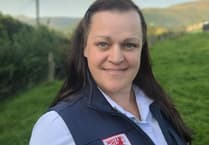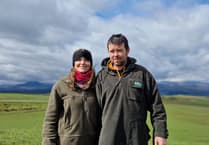The impact of climate change and bringing together livestock agriculture, health and biodiversity to provide solutions, was discussed at a major industry conference in Belfast titled ‘The Role of Livestock in our Ecosystems and Economy.’
The BSAS Conference (British Society of Animal Science) included contributions from Hybu Cig Cymru – Meat Promotion Wales’s (HCC), Dr Eleri Thomas and Dr Heather McCalman, who represented the Welsh red meat sector at the prestigious conference of the society in its 80th year.
HCC sponsored the session on ‘Sustainable Small Ruminant Systems’ which highlighted linkages between production systems and lamb meat quality. The session provided valuable information on how to better manage small ruminant production systems and monitor progress towards improved sustainability.
Dr Eleri Thomas, HCC’s Future Policy and Project Development Executive presented the final overall results from the Welsh Lamb Meat Quality Project. This large scale, UK-based project took place over a five-year period and formed part of HCC’s Red Meat Development Programme. It came to the conclusion that Welsh Lamb meat is healthy, nutritious and has good eating quality, and that lambs finished on grass and/or forage diets had higher levels of omega-3 and essential amino acids.
Dr Thomas said: “The BSAS Conference is an important, informative event in the academic calendar and provided a valuable opportunity to share key results from the Welsh Lamb Meat Quality Project with industry representatives and academics from across the UK.
“The delegates came from all over the globe and were genuinely fascinated to hear how lamb finishing diet, lamb gender, and muscle cut affected the eating and nutritional quality of the meat, and how these results provide fantastic evidence to work from as we look to ensure that PGI Welsh Lamb remains ever popular with consumers in the future.”
Dr McCalman highlighted how animal husbandry and environmental management can work together for red meat production and to care for nature.
Evidencing this, she outlined how baselines for environmental credentials in hill and upland sheep systems in Wales were assessed, and presented the results from HCC’s recent Hill Ram Scheme.
She said: “It was great to engage with the delegates and discuss how to develop metrics to demonstrate how progressive genetic improvement in maternal traits in flocks can go hand in hand with low carbon footprints and the biodiversity benefits to the landscape across the hills and uplands of Wales.”
Dr McCalman also presented in the session on ‘Farmer and Vet Behaviour Change’, noting the value of interactive intervention to achieve real results in improving health and welfare in sheep flocks by applying simple but effective management techniques. “It was great to be able to share a successful example from the Welsh red meat sector and to be an integral part of a wider ‘Healthy Feet Happy Sheep’ campaign across the UK.
“The conference theme suggested that livestock has an important role in the economy of many countries, and Wales is most definitely one of them. The keynote speakers reinforced the concept that grazing cattle are part of the solution to climate change and we look forward to working with the industry to share this message and other learnings from the event about livestock’s role and contribution to the economy.”



